|

Satara Doratuwa:
Attempt to introduce advanced literary theory in Sinhala
Reviewed by Indeewara Thilakarathne
Satara Doratuwa, a book by Prof. Kulatilaka Kumarasinghe and Prof.
Wimal Dissanayake is an important contribution to Sinhalese literary
studies. The book attempts at introducing the latest developments in the
sphere of literary theory to Sinhala readers in lucid and simple
Sinhalese.
The primary objective of the book is to focus on four important
concepts in literary creations. The four concepts are the writer, the
text, the reader and the context. Satara Doratuwa or four doorways refer
to these four aspects. The book in the form of an interview by Prof.
Kulatilake Kumarasinghe of Prof. Wimal Dissanayake is basically
attempting to introduce some of the most advanced literary theory around
the four concepts.
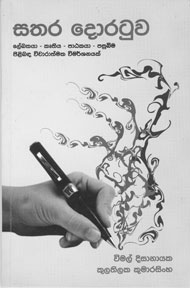 The book traverses the evolution of literary theory from early days
of liberally humanistic literary criticism to the post modern literary
criticism. Dominant literary theories such as Marxist literary theory,
application of psychology in literary criticism and the school of
feminist literary criticism have been described in simple terms. The book traverses the evolution of literary theory from early days
of liberally humanistic literary criticism to the post modern literary
criticism. Dominant literary theories such as Marxist literary theory,
application of psychology in literary criticism and the school of
feminist literary criticism have been described in simple terms.
Though it is not possible to discuss the advanced literary theories
that the book attempts to introduce, it is pertinent to some of the most
advanced literary theories that Satara Doratuwa discusses in order to
bridge the knowledge gap in Sinhalese readership.
In discussing the gradual decline of the author's power, the authors
have cited major thesis in the area such as those of Ronald Barthes.
However, the authors point out that what Bathes pointed out was that the
author has not died as some would understand but author's power has
dramatically reduced over the years.
Structuralism is another important literary theory that the book
touches on. It is a mode of analysis which profoundly influenced
literary criticism in the 20th century. Structuralism is effectively
applied in the field of "Narratology" . Narratologists analyse the
systematic features and functions of narratives, attempting to isolate a
finite set of rules to account for the infinite set of real and possible
narratives using structuralist methods and principles. Structuralism
also deals with a part of theoretical baggage of Marx and Freud.
Phenomenology is another important area that the book introduces to
Sinhalese readership, perhaps, for the first time, in a substantial
manner. It basically studies the structures of consciousness as
experienced from the first-person point of view.
The innermost structure of an experience is its intentionality which
is being directed towards something, as it is an experience of or about
some object. An experience is directed towards an object by virtue of
its content or meaning (which represents the object) together with
appropriate enabling conditions.
Another important concept is the reader. The book codifies in an
interesting manner How the reader became important in literary studies
with the evolution of phenomenology and the Reader Reaction theories.
The thesis basically states that the reader should not be considered as
a passive participant but as active partner in rendering meaning to the
text.
Although the role of the reader has recently been recognised in
Western literary criticism, it has been well recognised as a central
concept in Sanskrit literary theory the book stressed.
The book sheds light on the latest developments of the concept of
Context against the evolution of Post Structuralism and Post Modernism
as major literary theories.
The authors should be commended for the attempt to introduce the
essence of the most advanced literary theories in Sinhala. The book is a
must read for scholars as well as the general public. The book is
published by S.Godage Publishers.
Mathaka Piliraw (Echoes of Memory):
Unique contribution to modern Sinhala poetry
Reviewed by Kalakeerthi Edwin Ariyadasa
"The test of a first-rate intelligence is the ability to hold two
opposed ideas in the mind, and still retain the ability to function."
- F. Scott Fitzgerald
Please allow me to take you on a conducted tour, to the inner and
private world of poet Sunil Govinnage's lyrical musings, to enable you
to confront creatively, a strange landscape of aesthetic thrills and
challenges.
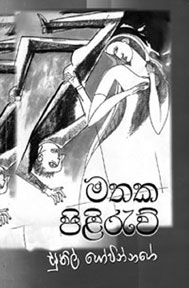 If you carefully train your ear, to capture the poet's voice, that
remains muted to an undertone, just below the surface of the printed
words of the poetry anthologized in the present volume, you begin to
discover a multiplicity of layers of implication. If you carefully train your ear, to capture the poet's voice, that
remains muted to an undertone, just below the surface of the printed
words of the poetry anthologized in the present volume, you begin to
discover a multiplicity of layers of implication.
It is generally assumed that, poems are the verbal icons, of
contending emotions, that intensely stir the depths of a sensitive
person's psyche. One would have thought, that, in such a whirlpool of
eddying feelings, there is hardly any room for logic and analysis, which
characterize hard prose. But, surprisingly enough, here, the poet
compellingly synthesizes logic and emotion, to produce a strand of
poetry enriched, at once, with analysis and passion. This rates to be
described as Sunil Govinnage's own brand of Metaphysical Poetry. He
employs logic in the division of chapters in his publication. The
Anthology is in five segments: The Old World, the New World, Poems
Penned on a Visit to the Memory Isle, Day-to-day, and Future Poetry.
Origin
The entry into Sunil Govinnage's world of poetry is through the
portal-piece titled "Poet" (Kaviya). The writer records the date (1976)
and place (Colombo) of origin of this poem, enabling us to utilize this
composition as a point of reference to trace his poetic progress over
the years.
This poem is a monument to the liberal romanticism that usually
overwhelms the sensitive young mind, prodded by a soul-consuming urge to
build the world anew to reflect his youthful dreams.
Even in this chronologically and physically distant poetic effort,
the incipient traces of the diction that was to mature into a distinctly
personal voice and the formative stages of the verbal usages that were
later to assume an impressive complex texture, were tellingly present.
The poems accommodated in the segment designated as "The Old World"
posses an aura of fresh perception. Thematically, the poems in this
section are wide-ranging and rivetingly innovative. Perhaps, Poet Sunil
Govinnage is the pioneering Sri Lankan creative writer, to movingly
elicit the pathos contained in the privation of helpless children,
waiting in a punishing queue to obtain a morsel of children's food, to
sustain the whole family. He exhibits an admirable dexterity to wring
poetry out of current news.
Towards the end of the first phase, the poetry of Sunil Govinnage,
had begun to acquire a keen capacity for verbal exploration of intimate
personal experience. In a poem titled "The paradise That Appeared in the
Office", dated 15 May 1985, the Poet creates highly memorable poetic
phrases to conjugate loneliness:
"To erase loneliness, with loneliness,
The silent files become my retinue."
Sense of nostalgia
To my mind, it is perfectly correct to establish that, the poems in
the category described as "the New World," stem from a deep sense of
nostalgia. The Poet migrates to a vast continent leaving his tiny home
Isle of Sri Lanka.
Even in the pre-migratory Sri Lankan phase the Poet's sentimental
education was largely determined by an internal sense of nostalgia. In
his formative years, his creative role-models were intellectual
stalwarts, who had transformed a personal sense of nostalgia into a
comprehensive national nostalgia. In that social context, in the first
decades of the 20th century, the urban-rural dichotomy was vividly
marked. Those sensitive persons who had to migrate to the city, left a
rural life in which a highly satisfying sense of freedom prevailed. In
the restricting and confining city, they experienced a sense of
nostalgia, yearning for the village ways they missed. Such leading men
of letters in the mid-twentieth century Sri Lanka, as Martin
Wickremasinghe, recalled with articulated longing, their expansive lives
of freedom, led in the childhood village. As he matured, he converted
his personal nostalgia into a national longing for its past and helped
the moderns to discover the treasures enshrined in such ancient classics
as the Jataka Tales (Birth stories of the Aspirant Buddha). It is highly
significant that, poet Sunil Govinnage, addresses a moving poem to
Martin Wickramasinghe, registering a mingled sense of awe and
admiration.
During this initial phase, poet Sunil Govinnage dramatized his
nostalgic yearnings, in a series of questing poems, in which he dwelt
lingeringly upon sights and sounds-men and women of his island home.
The Australian sojourn, provided the poet with a solid and highly
fertile raison d'etre for sustained nostalgia.
Ultra-sensitive psyche
In the bewildering host country, the ultra-sensitive psyche of the
poet, suffered a series of culture-shocks, making creative sparks fly in
all directions. His initial response to this confusion and temporary
sense of cultural disorientation, imparts a vivid creative life to his
first poem in the new land. His poem, "Before Settling Down ," opens the
segment titled "The New World." What dominates his mind is the
impression of the awkward clock-work hurry of the unknown white-folk,
who rush about as if they were automated pieces, driven by an unseen
force. The poet has not yet gained adequate entry into their seemingly
"alien" ethos, as he has not been able to wrench himself free from the
comforting security of his island-home. The outcome of all these
currants and cross currants is the emergence of the personality of the
poet into a surprisingly unique creative entity. In the poem titled
"Before Settling Down", the liens gush forth in sputtering, incantatony
outbursts, evoking the rhythms of a mantram. In a potent image the poet
transfers his inner intimidation to the sun as well.
"Like a frightened child,
The sun too scurries for shelter
Leaving the main roads and paths."
But, the poet has no time for feelings. He has to come to
terms-though reluctantly - with reality. He has lost his vast world. He
must kill his soul and must get to his workplace. To resuscitate his
dying body, he must make his heart warm, with a medicine he is quite
familiar with. He slinks into a tea-kiosk, and warms his lips and mouth
with a sip of Sri Lankan tea. The heart-warming memories of the lost
reality, sustain him - at least for the time being. As a striking
poeticizing of the harrowing pangs of nostalgia, this effort could very
will be rated a gem.
In his prefatory note to this anthology, the poet tends to
characterize, most of the poems collected here, as reflecting "a sense
of place".
When you imbibe and absorb the inner essence of most of these poems,
the phrase "Sense of Place", seems to be disturbingly inadequate. A poem
reflecting a "Sense of Place", is a composition that has moved to a
slightly higher elevation than mere reportage. But, most of the poems,
put together in this volume, are replete with instances of "Lost places"
and "Lost ages".
Cumulatively, the poetic assertions enshrined in this volume, form a
complex and composite world, that is the poet's own. In the conventional
geographical sense, the poets put together here, are not at all
"place-specific", though eh locates some of them in regions that are
publicly known.
The poet has conjured up an inner landscape, synthesizing his
variegated experience. He has imparted a permanent and lasting form to
the ephemeral, fugitive and transient elements in these experiences, by
making them inhabit his poetic landscape.
In consequence, the totality of his poetry is a metaphor of
nostalgia, for the lost and the eluded moments. The poet's nostalgia
assumes intricate guises. Initially the poetry emerges out of the
memories of the childhood land. The major nostalgia wave begins to lap
his psyche when he migrates, leaving behind the land of his birth.
These aspects of longing may appear simple and straight-forward
enough. But, in the land of the whites, yet another facet to his
nostalgia makes its presence vividly dealt, when he contrasts the
childhood of his offspring, with his own early years spent in a Sri
Lankan village. In the piece titled "The Generation Gap," the poet
contemplates-with a tinge of yearning no doubt-how he was raised in the
lap of unadorned nature.
The crow-pheasant seeking breakfast in their tiny front-yard was the
nature's alarm-clock, that reminded him of school. He is nudged into
full awakening by the cup of strong tea provided by the mother. Crossing
stretches of paddy fields, walking on a log athwart a stream, you reach
the school.
Contrasting world
The stanzas in this section of the poem are in uncluttered Sinhala.
But, the second phase of the poem transfers you with a jolt, to the
contrasting world of his offspring's childhood.
The alarm-clock "rings" at seven and the world bereft of
crow-pheasants is viewed through the TV eye. "Cereals" serve as
"breakfast." "Take-away," substitutes the satisfying dinner cooked by
mother.
The creative dynamism, that propels his poetry, suffusing it with
verbal energy and piquant imagery, is determined largely by the
strategems and mechanisms the poet is forced to device to orchestrate
this tangled web of nostalgia. The essential spirit of the Poet's
residual emotions could be effectively captured, I believe, with the
phrase "monochrome nostalgia" since the opposing forces are
predominately black-and-white.
The subtle inner urge of the poem titled "Aussie Folk Poem", is to
impose an "ourness" on the alien Aussie ethos. The Poet says in effect,
that, though the cultures may seem to present surface contrasts,
underneath, they are all the products of one common "folk" element.
On a visit to the Island Home, Poet's sensibilities are rudely
assaulted by Sri Lanka's urban chaos, which scandalizes the impression
of orderliness of the cities he left behind in the host land.
Old age
His poem headed "The Demented City of Colombo and the Poets'
Hermitage" harrowingly monuments the urban degradation. According to the
poet, "Demented cars run around lurching drunkenly. Taken ill, buses
shiver. Garbage walls have sprung up by the road-side, with bluebottles
pirouetting on them".
In most of his latest poetry, the traces of a pre-mature
pre-occupation with the on-rush of old age, can be detected. This, to my
mind, is largely a studied posturing, that yields advanced poetry.
In a poem titled "Disappearing Trails," the poet movingly ponders
upon his portending old age, producing some of the exquisite poetry in
this anthology:
'The sun extinguishes slowly
Shadows are cast around.
Lumps of darkness flutter their wings
Life sobs.
Bird-warblings that wafted from morn are diminishing.
The last of the sun's rays
Sinks in the midst of darkness.
Memories of youth
Drown in the river of dark waves,
An affectionate poem
Floats along
The path that was trodden gets eroded
Even the memory is bent
Dark shadows spread
Impeding the path ahead.
Time is a mirage
On the path that was taken
The unfinished tasks
Are a curdling darkness.
In this rough-and-ready rendering the subtle nuances may not quite
come through. But, the easily recognizable features of great poetry are
amity present here.
Quintessential poet
The upshot of all this is Sunil Govinnage is the quintessential poet,
who lives and breathes "Poetry." He gives poetic tongue to the travails
of millions of migrant souls, who are compelled to suffer an alienated,
nation-less and identity-less form of semi-existence, the soul-searing
angst of which cannot be effectively articulated by most.
Sunil Govinnage succeeds pre-eminently in salvaging the fractured ego
of the global stranger, who has everything but owns nothing, who lives
everywhere but has no home anywhere.
In his poetic incarnations, he is the black-swan who would rather
remain that way, without bartering it for white-swanhood, clutching his
sustaining memories.
But, it is imperative that, we do not, in any way, overlook his
unique contribution to the main-stream of modern Sinhala poetry.
Eschewing the insular beaten-track of routine poetic creations, he has
dared to make his vibrant Sinhala poetry an efficient vehicle, to convey
universal urges, widening, in the process, the horizon of expressive
potentialities of Sinhala Poetry and the Sinhala Language.
He has endowed upon Sinhala poetry, an anxiety-ridden diction,
befitting his individual inner voice.
Currently too, poet Sunil Govinnage possesses, at least a peripheral
global-presence as a poetic interpreter of the diaspora sensibility. All
the essential ingredients are emphatically present in his creative
personality, to elevate him to high-profile major poet-hood.
Book Skimmer
Malagiya Atto Samaga Navakata Kalawa
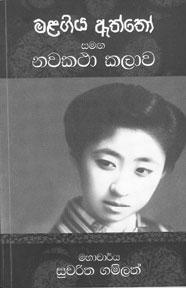
The book is a critical essay by Prof. Sucharitha Gamlath on Prof.
Ediriweera Sarachchandra’s novel Malagiya Atto which has been prescribed
for Advanced Level Sinhala syllabus. Apart from the critical essay and
study guide to Malagiya Atto, Prof. Sucharita offers readers, students
and teachers a comprehensive essay on modern novel from its inception to
the present.
Madara 3
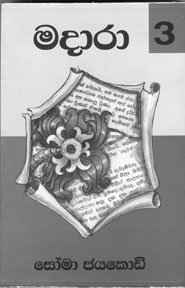
Madara 3 is the third in the series of novels by popular author Soma
Jayakody. The author has so far written over hundred fictions in Sinhala.
Some of her novels had been turned into teledramas.
Watha Randi Nirupikawa
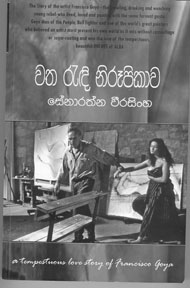
Watha Randi Nirupikawa is the Sinhalese translation of " The Naked
Maja" by Senaratne Weerasinghe. Significantly it is the 50th translation
by Senaratne Weerasinghe who is one of the best Sinhalese translators.
The Naked Maja is the life story of the artist Fransisco Goya. It is a
novel which shows how a biography can be successfully turned into a
novel.
Book launch
Dhara
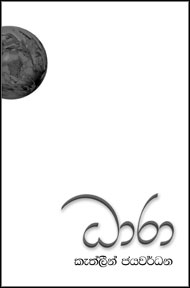
Dhara, the latest novel by veteran writer Kathleen Jayawardana will
be launched on September 14 at 3.00 p.m. at the M.D Gunasena's
Auditorium, 150 Mihindu Mawatha, Colombo 12. The head of the Department
of Language and Culture at the University of Sri Jeyawardenepura Dr.
Samanchandra Ranasinghe will introduce the book while the ceremony will
be presided over by Prof. Sucharitha Gamlath.
The novel widely held as a turning point in contemporary Sinhalese
novel deals with the multifaceted functions of the power at different
levels in the complex milieu.
|

